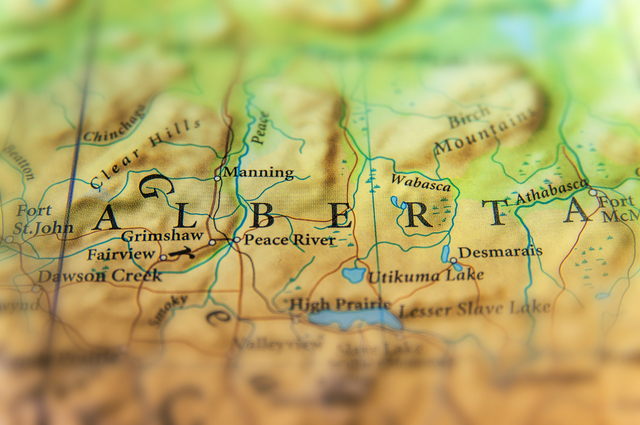
Free trade is a battleground issue around the globe right now, but Canada might have it worse than others. In the Great White North, not even the provinces get along. The demise of the Alberta Small Brewers Development Program is a benchmark case for Canadian protectionist policies between provinces. Here’s the not-so-quick backstory:
Back in 2015, Alberta introduced a $1.25 markup tariff tax on beers from provinces outside of the New West Partnership (a trade agreement between the governments of British Columbia, Alberta and Saskatchewan). At first, beer producers and beer importers from Alberta, British Columbia and Saskatchewan paid a graduated markup, which allowed reduced rates for breweries with small annual production. The other province players (regardless of size) paid a flat $1.25. As you might expect, this did not sit well with beer pros from other provinces. In July 2016, Calgary-based Artisan Ales Consulting Inc. requested that a Person to Government proceeding be initiated in respect to these unfair markups applied to beer imported only from certain Canadian provinces into Alberta. Multiple panels under the Agreement on Internal Trade agreed with Artisan Ales; the AIT is a trade partnership to reduce and eliminate barriers between the provinces.
Not so coincidentally, after the complaint (like the same month, July 2016), the policy was changed to a flat tax applied to everyone, regardless of where the beer was made, but that wasn’t the end of it. It was just the beginning of the Alberta Small Brewers Development Program, which was also announced in July 2016 and ended up being just a rebate scheme that essentially reduced the tax rates for Alberta’s craft breweries back to the previous structure through grants.
Toronto, Ontario-based Steam Whistle Brewing and Saskatoon, Saskatchewan-based Great Western Brewing Co. sued over the program, saying that the grants are an unconstitutional trade barrier violating Canada’s Agreement on Internal Trade. A court awarded the breweries $2.1 million in restitution, but that’s being appealed.
Whew. Let me catch my breath … Well, the saga continues. Yesterday, personal injury attorneys at Toronto-based Rochon Genova LLP announced the filing of a proposed class action in Calgary, Alberta, against the Government of Alberta and the Alberta Gaming, Liquor and Cannabis Commission in respect to all of the above. We quote the press release:
Ron Podolny, partner at Rochon Genova LLP in Toronto, commented: “In this time of rising trade tensions among provinces and internationally, it is important to uphold the cornerstone Canadian constitutional principles concerning free trade. Provinces are not permitted to enact protectionist policies that favour their domestic industries over competitors from other provinces. Goods manufactured in one province must be permitted to be sold in another, free of discrimination. When these principles are violated by governments, and artificial internal trade barriers are erected, Canadians who have suffered resulting financial harm deserve compensation.”
Who’s involved in this? According to the release, the proposed class action has been brought on behalf of all persons who imported craft beer manufactured in another province into Alberta, as well as all residents of Alberta who purchased out-of-province craft beer in Alberta. We reached out to the Alberta government, and they sent us a statement from Finance Minister Joe Ceci:
“Our government will continue to have the backs of Alberta’s small brewers. The Alberta Small Brewers Development program resulted in a huge increase in craft brewing in Alberta which created jobs and used great Alberta agricultural products. Alberta maintains the most open liquor market in the country with over 4,000 beer products available for purchase. Our model means that beer and liquor from other provinces is welcome in Alberta while our products are shut out of other provinces like Ontario and B.C. We will continue to support our local craft industry and are not ruling out challenging other province’s restrictions on Alberta beer and liquor.”
Ceci’s correct. Interprovincial alcohol policies, laws, taxes and trade agreements are exhausting and unfair all over Canada. It’s not just Alberta. In fact, the Alberta Small Brewers Association likes to note that Alberta is actually the only province that allows the free flow of beer across provincial borders. Every other province is controlled by liquor control boards. Many see these liquor control boards as gatekeepers to retail success as they use their control over government-owned liquor stores to promote local products with preferred placement and promotion. That’s just one example of provincial protectionism that goes with alcohol in Canada, but the Alberta Small Brewers Association is (in its current form) another example (read extensively about the program here).
What happens next?
We reached out to Podolny, and he informed CBB that the next procedural step is the certification motion. At the certification motion, the court will decide whether this case can proceed as a “class action” — i.e. whether some questions can be stated and resolved in common for all members of the class.
“If a court certifies this case, it will specify in its order who is included in the class,” said Podolny. “Individuals and businesses will then have the opportunity to ‘opt out’ of the class action or to remain part of the class. In the Statement of Claim, we are asking the court to certify the case on behalf of all out-of-province brewers who exported craft beer into Alberta, their agents, as well as licensees and individual customers who purchased out-of-province craft beer in Alberta. The advantage of a class action as a procedural vehicle is that it enables groups of individuals and businesses who were harmed by the same unlawful act to recover compensation in one proceeding. If the case is certified, then the court will be asked to decide whether class members are entitled to compensation for the regulatory measures which we allege were unlawfully imposed on them by the Province of Alberta and AGLC.”





Leave a Reply
You must be logged in to post a comment.